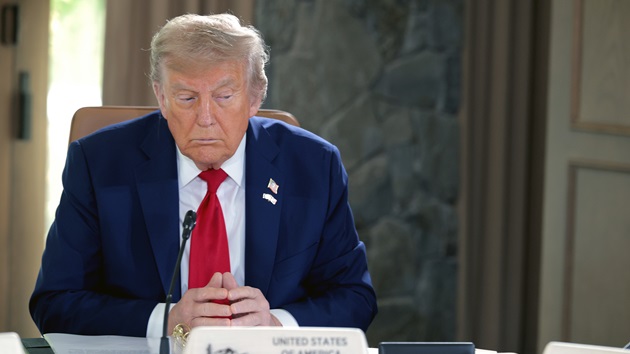
(WASHINGTON) — President Donald Trump ratcheted up tariffs on Canada late Thursday, stoking tensions with a top U.S. trade partner as the two sides try to hash out a trade agreement by the end of the month.
The Dow Jones Industrial Average tumbled 250 points, or 0.5%, in early trading on Friday, erasing some of the index’s gains in recent weeks as it approached a record high. The S&P 500 dipped 0.4%, while the tech-heavy Nasdaq fell 0.2%.
Canadian Prime Minister Mark Carney struck a forceful but measured tone in a response late Thursday night, saying on X that Canada would continue trade negotiations while defending its national interests.
Here’s what to know about new U.S. tariffs on Canada, and what they mean for fraught economic relations between the two allies:
When will Trump’s new tariffs on Canada take effect?
The fresh round of 35% tariffs on Canadian goods will take effect on Aug. 1, which matches the start date of levies issued for more than 20 other countries in recent days.
Aug. 1 also marks the deadline for ongoing trade negotiations between the U.S. and Canada.
Canada already faces 25% tariffs on exports to the U.S., though those levies exclude a host of goods compliant with the United States-Mexico-Canada Agreement, or USMCA, a free trade agreement.
Trump threatened to escalate tariffs beyond 35% if Canada opts to retaliate with tariffs on U.S. goods.
Canadian goods are also subject to sector-specific tariffs, such as 50% levies on steel and aluminum as well as 25% tariffs on non-USMCA compliant autos and auto parts.
Why did Trump propose new tariffs on Canada?
Trump offered up two reasons for the fresh round of tariffs, which align with grievances voiced by Trump in previous trade announcements targeting Canada.
First, Trump faulted Canada for its alleged failure to stop the transport of fentanyl into the U.S.
“As you will recall, the United States imposed tariffs on Canada to deal with our Nation’s Fentanyl crisis, which is caused, in part, by Canada’s failure to stop the drugs from pouring into our Country,” Trump wrote in a letter to Carney, which was posted on social media late Thursday.
Between September and April, nearly all fentanyl seized by the U.S. came through the southern border with Mexico, according to U.S. Customs and Border Patrol, or CBP. Less than 1% of fentanyl was seized at the northern border with Canada, CBP found.
Next, Trump sharply criticized tariffs and other trade barriers erected by Canada that put U.S. businesses at a disadvantage when seeking to reach Canadian shoppers. Those barriers, Trump said in the letter, have brought about a U.S. trade deficit with Canada.
Last year, the U.S. ran a trade deficit with Canada of $63 billion, which marked a slight decrease from the previous year, according to the Office of the U.S. Trade Representative. By comparison, the U.S. ran a larger trade deficit last year with its other top trading partners: A $295 billion deficit with China and a $171 billion deficit with Mexico.
How did Canada respond to Trump’s new tariffs?
Carney posted a 114-word response on X late Thursday that appeared to avert further escalation of trade tensions while striking a firm posture in defense of Canada’s economic interests.
“Throughout the current trade negotiations with the United States, the Canadian government has steadfastly defended our workers and businesses,” Carney said. “We will continue to do so as we work towards the revised deadline of August 1.”
Carney responded directly to Trump’s allegations about Canada’s failure to address fentanyl, saying Canada had “made vital progress to stop the scourge of fentanyl in North America.”
“We are committed to continuing to work with the United States to save lives and protect communities in both our countries,” Carney added.
The tit-for-tat public proclamations from Trump and Carney follow a hiccup in trade negotiations late last month, when Trump suspended talks over Canada’s plans for a Digital Service Tax, which would have imposed a 3% levy on U.S. technology companies. Talks resumed days later after Canada abandoned plans for the tax.
Canada previously retaliated against tariffs with levies on U.S. goods, slapping tariffs on $20.7 billion of goods in March as well as 25% tariffs on non-USMCA compliant autos in April. As of early Friday, Canada had not announced another round of retaliatory tariffs in response to the latest levies.
In his social media post on Thursday, Carney noted that Canada has sought trade agreements with other countries in an effort to bolster its economy.
“We are building Canada strong,” Carney said.
Copyright © 2025, ABC Audio. All rights reserved.
